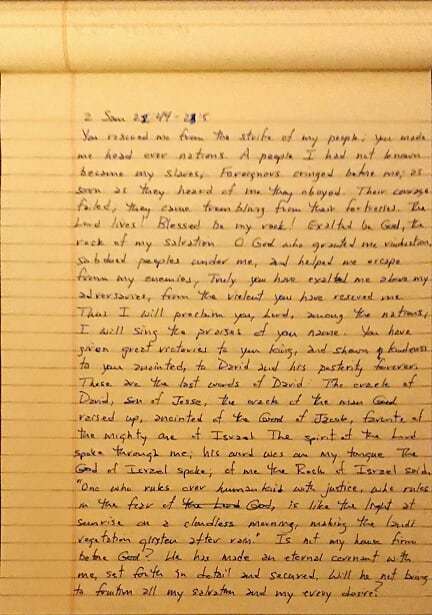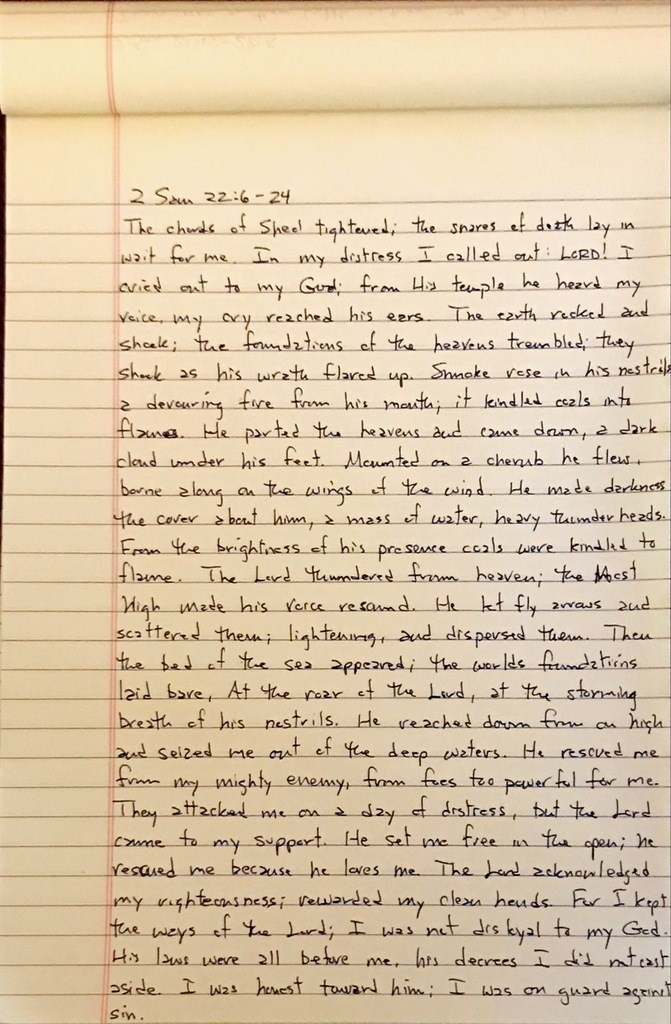- Home
- Daily Meditation
Victorious Me

Synopsis 2Sam 22:44-23:5 2/6/2019
David wrote as a poet. And in this psalm of praise, he noted how God had made his life victorious. For through his life, God had brought peace to the people. What’s more, David saw God as utterly dependable and absolutely unchanging – like a rock.
As David prepared for his own death, he once more reflected on God’s goodness. In this way, he observed how God had anointed him with purpose. And he remembered how God had supported him throughout his ministry because David had ruled justly.
Victorious David
David’s lived a life of vulnerability. Although he was a great king, he rejected a life of ease. He knew great challenges. And he knew great successes. But he also knew failures, disappointments and even extraordinary tragedy.
And yet, throughout his life he lived victoriously. At the end, he was the victor. In God’s care, he was never vanquished.
Victorious Me
And that’s the place to live. God has given me everything for life and for Godliness. So, I can’t really fail.
So, don’t you forget: You can’t fail.
I will walk in victory.
In Christ, no one vanquishes the Lord’s anointed.
“No, in all these things we conquer overwhelmingly through him who loved us.” Rom 8:37
Learning in the Way

Synopsis 2Sam 22:25-43 2/4/2019
David wrote this psalm of praise. It was a reflection on the nature of God.
God was perceived and experienced one way by people who loved Him and trusted Him. But he was experienced differently by people who did not. So, according to David’s experience, a faithful person would find God faithful. But a perverse person might find God to be “devious”.
Another aspect of David’s reflection was the way God prepared and intervened in David’s life. It was God, according to David, who not only protected him, but also trained him to be effective in his ministry.
The God of Training
David once wrote, “Blessed be the Lord…who teaches my hands to war.” The king understood that God invested wisdom into the lives of people through experience. So, for him, everything was training. He was always learning.
And because he loved God, he trusted in whatever lesson God was working to teach him.
Way of Learning
David’s approach is a good example of the way of learning.
I learn from experience. And this process is both synthetic (it produces new knowledge based on previous knowledge) and systematic (it has predictable outcomes). So, it follows that wisdom will proceed naturally if I am open to learning in the way that God chooses to teach.
From your judgments I do not turn, for you have instructed me.” Psalm 119:102
Affection, Emotion, Behavior

Synopsis 2Sam 22:6-24 2/1/2019
King David was a poet and a warrior. So, he wrote figuratively of how God responded to his cries for help. He described the unleashing of God’s power as a fury of thunder and lightning. And he described the manner of God’s salvation from distressing circumstances in terms of the very forces of nature.
The Emotion of David
David knew the power of God through the extraordinary circumstances of his life. As a result, his experience of God’s faithfulness naturally stoked his positive affections for God.
In his writing, David represented the emotions he ascribed to both God and himself with powerful contrasts. For David, God’s burning desire to save him from difficulties was like the rushing wind, or burning fire, or fierce lightening. All of these things cause human beings intense feelings of fear or awe. Conversely, he described the places of God’s salvation as “open” or “on-high” – meaning above the fray. And these metaphorically described the sense of safety and protection and peace.
Affection, Emotion and Behavior
Powerful emotions drive human action. Of course, emotional energy is a response to the value (or disvalue) of my circumstances.
This is the things to remember: It’s the way I interpret my affections that determines whether I love, hate, desire or feel offended by my circumstances. My affections drive my emotions which in-turn drive my behavior.
This is why examining my heart requires reconciling my affections against what is actually true, or what is really good, or what essentially beautiful.
“Finally, brothers, whatever is true, whatever is honorable, whatever is just, whatever is pure, whatever is lovely, whatever is gracious, if there is any excellence and if there is anything worthy of praise, think about these things” Phil 4:8
Get in the Fight

Synopsis 2Sam 21:15-22:5 1/31/2019
The Israelites engaged in another war with the Philistines. King David led the army in the battle. However, in the thick of the fight, David became weary. And he was no longer able to keep going.
A Philistine giant noticed David’s fatigue. So, he approached the king intending to capture him. However, Abishai saw the giant’s advance. And so, he came to the rescue. There, in the midst of the battle, he killed the giant. After this, David’s soldiers insisted that he no longer accompany the army into battle.
The Israelites fought with the Philistines again. And in the end, the army of Israel killed four celebrated giants. Each of these was considered a descendant of the Rephaim.
And David wrote a psalm of praise. In it, he acknowledged the God of all creation who had led him, and kept him, all the days of his life.
David the Ancient Warrior
His men had to ask David not to come out to battle. Actually, they forced him to no longer come to the battle. His spirit wanted to lead. But the practics of war dictated. For, he had become a liability.
And that’s the way it is with an old warrior. David wanted to be on the field of battle. And, he wanted to be in the fight. More specifically, he wanted to be in the middle of God’s deliverance.
Get in the Fight
Because, God delivers those who are in the midst of battle.
But let me be clear. My battles aren’t in Iraq, or Afghanistan. And for that matter, they generally don’t even involve other people.
Yet, there is certainly a kind of warfare in Christ-following. For, if this is going to be what God wants, I have to be willing to lay everything on the line. And I must meet each of my days with a total determination.
I must commit to the way of action. And that means being neither cavalier, nor afraid to let go of those things that hold me back.
“Thus I do not run aimlessly; I do not fight as if I were shadowboxing. No, I drive my body and train it, for fear that, after having preached to others, I myself should be disqualified.” 1Cor 9:27
Rizpah My Challenge

Synopsis 2Sam 21:8-14 1/30/2019
Saul transgressed against the Gibeonites. So, King David allowed the Gibeonites to exact restitution on Saul’s children. Because their people had been nearly exterminated, the Gibeonites refused money or any other form of restitution. Instead, they required the deaths of seven of Saul’s children.
King David selected the victims from amongst Saul’s sons and grandsons. So, the men were all born to either Saul’s daughter Merab, or to his concubine Rizpah. As agreed, the Gibeonites killed the men and then suspended their bodies from a tree.
Rizpah remained with the bodies of the men. And she made it her business to prevent either birds or wild animals from eating the men’s remains. Eventually King David heard about Rizpah’s determination. And he had pity.
Accordingly, he had the remains removed from the tree. And then he had them buried properly along with Saul’s bones in their tribal land of Benjamin.
The Faithfulness of Rizpah
Rizpah. So how can we come to understand this woman?
Contrast her behavior to Saul’s behavior.
Saul the man.
Saul could never quite wait. He could not wait on the prophet to offer sacrifice. And he could not wait on God to lead his destiny. He would not let God be God. And he ended up fighting against God’s purpose. And this, to his own utter, and complete, destruction.
Rizpah the woman.
Rizpah was Saul’s concubine. So, she wasn’t even his wife. He saw her as expedience. And, he saw her as object. She was convenient. And, she was bought with a price for a specific purpose.
But Rizpah had a dream. And it was singular. It was her only dream. More specifically, it was the only dream she could have. Children. She was a mother. And she lived for her children.
So when her children were taken and killed – it just made sense that her dream would die with them. But it didn’t. She persevered through the pain of their execution. And she remained steadfast to their memory and to their honor. And she fought against the curse of criminal death. She fought against the curse of being executed and hung on a tree.
Rizpah My Challenge
And so, Rizpah’s legacy remains. It moved a king to act. And even now, as I read her story, it shames my lack of commitment to enter into the possibility of my life.
Mother Mary – intercede on my behalf that by the Holy Spirit I may forever quit my commitment to mediocrity.
“I declare: “Gods though you be, offspring of the Most High all of you,Yet like any mortal you shall die; like any prince you shall fall.” Psalm 82:6
Access to God’s Grace

Synopsis 2Sam 20:24-21:7 1/29/2019
The land of Israel experienced a famine. And David recognized by the length of the famine that something had injured Israel’s relationship with God. So, he made inquiry. And he came to realize that an unreconciled injustice was the cause of the plague.
It seems that in his zeal, Saul had persecuted the Gibeonites, along with the other Canaanites who occupied the land. However, centuries before, Joshua had made a pact with the Gibeonites. So, Saul’s persecution was an injustice in the eyes of the Lord.
So, David determined to reconcile the injustice. As a result, he brought in Gibeonite leaders. And he inquired of them what they would accept as restitution.
The Gibeonites asked for seven members from amongst Saul’s descendants to be executed. And David agreed to this request.
Israelite’s Access to God’s Grace
Saul had hunted down the Gibeonites to the point of near extinction. Despite Joshua’s treaty with them, Saul had knowingly persecuted them. And this injustice injured the Israelite’s relationship with God to the point that they collectively experienced an apparent diminishment of grace.
In his youth, David attempted to move the Ark of God. But he didn’t follow God’s process. So, he had experienced an apparent diminishment in God’s grace. Accordingly, David recognized that the grace of God was affected by the sin of the community. And He was willing to do anything to restore the Israelite’s access to God’s grace.
Access to God’s Grace
God’s graciousness doesn’t go away. It never goes away.
But that doesn’t mean that I can’t block access to grace through my own sin. For sure, God is faithful. He is faithful all the time. He is love. And He is mercy. And He is for me.
I alone am responsible. So, I come to Him, in humility, or not.
“For I am convinced that neither death, nor life, nor angels, nor principalities, nor present things, nor future things, nor powers nor height, nor depth, nor any other creature will be able to separate us from the love of God in Christ Jesus our Lord” Rom 8:38-39
Me in My Community

Synopsis 2Sam 20:15-23 1/28/2019
Joab led King David’s army. They were in pursuit of a rebel named Sheba. And Sheba had fled to a city in the tribal region of Dan named Abel Beth-maacah.
So, Joab and his forces came to the city. And they placed the city under siege. Along the way, they built a siege ramp. After this, they began to batter the city’s protective walls. As the forces pressed their siege, a wise woman from the city spoke with Joab.
The woman and Joab negotiated. And then the woman went back to the leaders of the city. The leaders executed Sheba because of his rebellion. And then they sent the evidence over the wall for Joab to see.
So Joab saw that Sheba was no longer a threat. And he sent his forces back to their homes. Joab returned to Jerusalem and reported to King David.
The Community of Abel Beth-maacah
Sheba was a rebel. The implication is that he recognized no authority – that he was unwilling to be ruled. And so, the community was forced to deal with this rebellion.
And this is really the lesson of the wise woman. To accept or protect Sheba’s rebellion would have brought ruin to the community. And this ruin was certain, whether or not Joab’s siege was effective. For, even if Joab had retreated, the rebel in the presence of the community, would have eventually hurt the community.
And so, the wise woman led her community to drive out the rebel before he destroyed what mattered most.
Me in My Community
Rebellion is always a dicey subject for Americans. Our nation was born through political rebellion. And so, it is fair to say that our fore-fathers were rebels. They were so certain they were right that they risked all.
Accordingly, they broke the old political order of colonialism and they formed something new. And so I, like many Americans, have an intuitive appreciation of rebellion. I think of it as a good thing. That is, as long as the rebellion isn’t against something I value.
But that’s always the rub. My heroes are my heroes because they were willing to risk everything for what they believed to be right. And, as God’s word reminds me, “Every man’s way is right in his own eyes.” So which “right” am I cheering when I think of my heroes.
So perhaps the caution is not to idolize rebellion. Instead, the encouragement is to recognize that the Authentic Community will always be. The communion of saints has no end. And, this is my first community. So, from this, rebellion is never acceptable. And it always leads to death.
“For a sin of divination is rebellion, and arrogance, the crime of idolatry. Because you have rejected the word of the LORD, the LORD in turn has rejected you as king.” 1Sam 15:23
The Blindness of Violence

Synopsis 2Samuel 20:7-14 1/25/2019
Though Amasa was general over the entire army of Israel, King David tasked Abishai with pursuing Sheba. King David gave Amasa three days to raise a new army from amongst the men of the tribe of Judah. But Amasa did not return on time.
So the remaining standing army and David’s mighty men began to follow Abishai. And even Joab was among those following Abishai. However, along the way Abishai’s force encountered Amasa at the town of Gibeon. There, Joab stepped forward and feigned a friendly gesture of embrace to Amasa. But once he had him in an embrace, he drew his sword and killed him.
Joab then left Amasa’s bloodied body on the ground and took command over the army. Joab’s servant encouraged the other warriors to follow Joab in all things military. And then they rolled Amasa’s dead body off the road, and out of the way.
Joab’s Blindness
For more than twenty years, David had empowered Joab as general over the army. However, he finally lost favor with David when he killed Absalom. So David gave Amasa command as gesture of solidarity and healing after the rebellion.
But Joab was unwilling to give up his role. And dispositionally, Joab objectified other people based on their utility. Even though Amasa was a near relative, Joab was blind to Amasa as a person. Joab saw Amasa as just an object between him and what he wanted. And so, because of this, Joab was a man capable of incredible violence.
Amasa was relatively weak. And he was in Joab’s way. So, Joab killed him.
The Blindness of Violence
Violence is obvious and valuable in the eyes of anyone who sees neither the other as a person, nor the God who Created all.
“Do not plot evil against your neighbors, when they live at peace with you… contend with someone without cause, with one who has done you no harm. Do not envy the violent and choose none of their ways: To the LORD the devious are an abomination, but the upright are close to him.” Prov 3:29-32
Then Jesus said to him, “Put your sword back into its sheath, for all who take the sword will perish by the sword.” Matt 26:52
I Am Amasa

Synopsis 2Sam 19:47-20:6 1/24/2019
The people of Judah and the rest of the tribes of Israel, came to the Jordan river. They came to welcome King David’s return. However, during the welcoming a dispute arose. On the one hand, the Judahites claimed a special relationship with David because of kinship. On the other, the Israelites claimed primacy in the royal relationship because of birth order.
In the end, a Benjamite named Sheba defected. And, he induced much of the northern tribespeople to do likewise. So, the Judahites alone escorted David back to his home in Jerusalem. There, he was installed once again as king.
Immediately, David tasked Amasa, his army general, with rallying troops. Accordingly, David sent Amasa throughout the tribe of Judah to collect a large volunteer force. After Amasa returned, David intended to use this force to track down Sheba. However, Amasa did not return on time.
So, David tasked Abishai with tracking down Sheba. And since Amasa had not returned, Abishai was to use only the small force on hand.
Amasa’s Reticence
David charged Amasa with a critical task. But Amasa failed at stewardship. He did not sense that real damage was being done to the kingdom. And this produced a lack of urgency.
No sense of the damage being done manifest as a lack of initiative.
On top of all this, Amasa lacked confidence. Although he was a near relative of both David and Joab, he had not distinguished himself in battle. So, he very likely lacked the confidence necessary to take initiative.
I Am Amasa
Too often, I am like Amasa. I see the damage being done in our world. And I even occasionally imagine that God has called me to respond in some small way. But when the time comes for action, my inclination is to think that things really aren’t that bad. Or I remind myself, “I’m only one person after all – what real difference could I make?
And I lack confidence. I have not distinguished myself in battle. In fact, concerning what little warfare could be attributed to me, I have a pretty dismal record.
Yet, God has called me. And He has called you. And like Gideon of old, He says to us, “Rise up mighty warrior.”
So, rise up mighty warrior. Let today be the day.
“Arise! Shine, for your light has come, the glory of the LORD has dawned upon you.” Isaiah 60:1
True Friends

Synopsis 2Sam 19:35-42 1/23/2019
King David journeyed from Manahaim to the Jordan River. As he did, he and his family and his army were escorted by Barzillai. Now, Barzillai was a wealthy man. And he had provided for David and his people while they stayed in Manahaim throughout the time of the rebellion.
The nation recalled David to once again be their king. And so, as David and his people made their way back to Jerusalem, David offered Barzillai a place in Jerusalem. But Barzillai declined the generous offer. He was already eighty years old. So, he wished to remain near his hometown for the remainder of his life.
But refusing a king’s generosity came with its own perils. So, Barzillai offered Chimham as a beneficiary of David’s generosity in his place. Most likely, Chimham was Barzillai’s son. And so, David accepted Chimham as Barzillai’s proxy.
David and Barzillai
Of all the people who came out to escort David to his restored throne, Barzillai had nothing to gain. For he alone had paid out to preserve David in the moments of his distress. And he did this seemingly without any anticipation of return.
The rarity of Barzillai’s generosity and friendship made a deep impression on David.
True Friends
The extraordinarily rich often express a certain burden. It’s hard to know who is truly a friend.
But the Way of Friendship is a practice that depends on seeing the other in the fullness of the possibility of their life. And working in harmony for that end.
“There are friends who bring ruin, but there are true friends more loyal than a brother.” Prov 18:24









